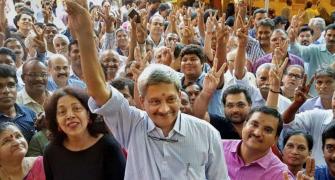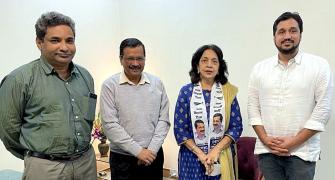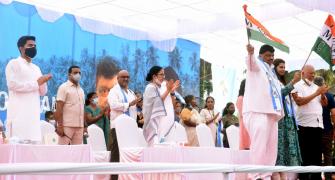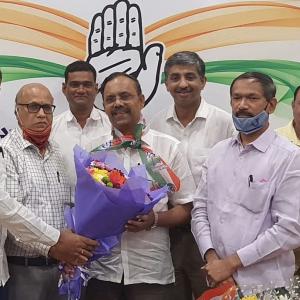'The politics of Goa is moving around a sole entity, which is land.'
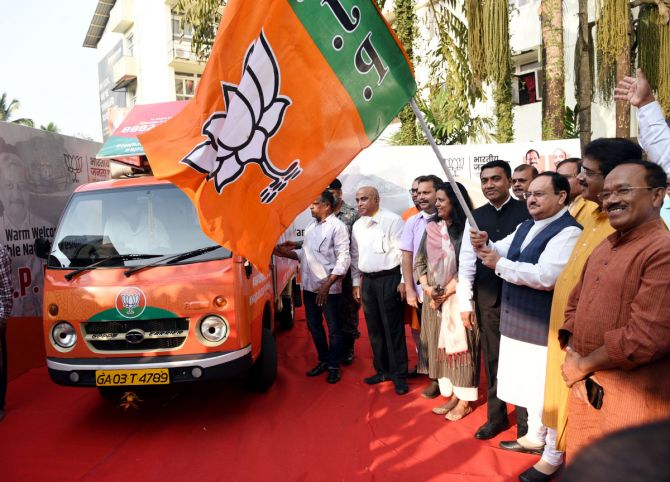
Veteran Goan journalist Sandesh Prabhudesai's book Ajeeb Goa's Gajab Politics gives insight into the history and politics of the western state.
The book is a must read for those who want to understand Goa from a historical and political perspective.
"Telling this factual history was of utmost importance to know today's politics of Goa," Prabhudesai tells Syed Firdaus Ashraf/Rediff.com in the first part of an e-mail interview.
Ajeeb Goa's Gajab Politics sounds like a Hindi movie. Why did you choose this title?
This is not an imaginary filmi name. India's first prime minister Pandit Jawharlal Nehru had said: Ajeeb hai yeh Goa-ke log (Goa's people are strange).
That was because when different regions of India were demanding linguistic states, a large number of Goans were demanding that 'Konkani Goa' be merged into 'Marathi Maharashtra'. Through this emerged the politics of Goa which proved to be much different from the rest of India, right from its first election in 1963.
Goans adored Nehru, but defeated his Congress in the first election, they brought a pro-merger party (Maharashtrawadi Gomantak Party) to power, but voted against the actual merger of Goa with Maharashtra.
The BJP could form a government only with the help of Christian minorities, whom their umbrella organisation RSS considers to be India's enemies.
Political parties, political analysts and even journalists coming from outside carry lots of misconceptions about Goa. When they realise these impressions are not true, they too say Goans are ajeeb (strange).
They wonder what gajab (astounding) politics this is.
They get surprised that normal parameters like caste, community, religion etc don't work in Goa.
It happened yesterday, it's happening today with parties like the Shiv Sena, AAP or TMC.
I thought it should not happen tomorrow. That's why I tried to explain through this book that neither are Goans ajeeb nor is Goa's politics gajab.
Why did you feel the need to go to the early settlers of Goa, Mundari, Kol and Asuras? Was it intentional on your part because for some reason popular Indian belief is that Goa came into existence only after the Portuguese landed in Goa?
Goa, or for that matter the Konkan coast, has a different geological history.
In about 10,000 BCE, the Konkan coast along with the Sahyadri and Nilgiri ranges got created through a seismic movement of Earth from the depths of saline waters of the Arabian Sea.
But a myth has been established through Sahyadri Khand that this land was a creation of Lord Parshurama, an incarnation from Lord Vishnu's Dashavatar.
The legend claims that the warrior sage supposedly stood on the peak of the Sahyadri ghat and shot an arrow towards the sea. The water receded and the land rose from the sea. He was a Brahmin warrior who supposedly annihilated the Kshatriya clan and set up the Konkan coast, including Goa. The land belonged to them.
But the historians tell us a different story, based on evidence, that the first settlers were the tribals like Mundaris, Kol and Asuras, mainly from Chota Nagpur, which today falls in Jharkhand state. They started cultivating the land by setting up a system of Gaunkari, which means the community ownership of land.
Since then till date, the politics of Goa is moving around a sole entity, which is land. Telling this factual history was of utmost importance to know today's politics of the land of Goa.
The current ruling (BJP) dispensation's version of history is that Aryans were never outsiders and it was only a Marxist interpretation of history. So why do you call Aryans latecomers in Goa?
I am sorry, but I am not saying that Aryans are latecomers. I have quoted the historians. And all of them are not Marxists.
A historian like Anant Ramkrishna Sinai Dhume, who has written The Cultural History of Goa: From 10000 BC - 1352 AD, was working in the survey department and has written a series of research articles on varied aspects of Goa's topography, geology, history etc etc.
He has proved with documentary evidence that Aryans were the latecomers. As a journalist, I have reproduced it in my book to call a spade a spade. That's all.
I have not rewritten history, I have re-searched it. That's why I call myself a Re-Search Journalist (not research).
Vasco da Gama first landed in Calicut in Kerala. Why then did the Portuguese decide to settle in Goa?
The Portuguese had no plans to settle in Goa even after Afonso de Albuquerque conquered the Goa in 1510. In fact, the king of Portugal had opposed his action.
The captains of the Portuguese fleet did not support him. In fact he was told to withdraw from Goa.
Adilshah had developed Goa at that time as one of the principal emporiums of trade on the western coast of India. Hindu traders had left the island due to harassment by the dominant Muslim trading class.
The Hindus returned after the Portuguese conquered it and were fully protected by the European rulers. They massacred 6,000 Muslims and their wives were converted to Christianity.
But eventually the situation changed, with more powerful Europeans traders like the Dutch and the French entering the Indian subcontinent and weakening the control of the Portuguese over the spice trade.
The Vijayanagar empire, their main client for horses and weaponry, also collapsed. Goa faced a major economic setback.
These circumstances compelled the Portuguese to hold control over Goa. They conquered the neighbouring territories of Bardez in the north and Salcete in the south and started ruling from Goa, amidst dire economic crisis.
What role did the Inquisition played in conversion of Hindus? In what way did the Portuguese changed the Hindu way of life of Goans? Is it true that at one point of time no new temples were allowed to be built in Goa under Portuguese rule?
Please don't mix up religious conversions with the Inquisition. The conversion was against the Hindus and the Muslims. They were converted to Christianity.
The Inquisition was against the converted Christians.
The spree of religious conversions lasted for 100 years, till 1610, and was done more aggressively during the second phase of four decades, from 1540 to 1580.
Demolition of temples took place in different phases. According to historians like A K Priolkar, who has written the book The Goa Inquisition, a bigger exodus of Hindus was witnessed when the Portuguese started enforcing anti-Hindu laws.
With a new viceroy changing his policy every four years, there are also instances of migrated Hindus returning to their homeland. There are also instances of re-conversions to the Hindu religion.
The Portuguese established their rule far away from their land by converting the Indians to Christianity. But they did not follow the same policy in Daman and Diu, the two ports they conquered near Gujarat from Shah -- Diu in 1546 and Daman in 1559. Not a single Hindu or Muslim was converted there to Christianity.
The conversion was part of their trade politics and was done through coercion and by blackmailing them by confiscating their land. Certainly not from conviction.
There was no question of building a Hindu temple when the existing temples were demolished.
But after the Portuguese regime changed its religious policy, the first temple, to Mahalaxmi, was built in Panaji in 1818. And it went on.
The Portuguese also did not demolish a single temple or masjid in the New Conquests, the larger part of today's Goa, which they started conquering from 1764 onwards.
I am not justifying what the Portuguese did. I am just placing facts before the readers through this book.
The Inquisition, however, lasted in a most active form for over two centuries, from 1560 to 1774, after which it was diluted and then formally abolished in 1812. It was more horrific.
The converted Christians were the prime target, though it was also rarely used against the Hindus. It was a systematic attempt to de-nationalise and de-culturise the converted Indians, from eastern to western culture and lifestyle.
All kinds of brutal methods, including punishments like burning alive, were used against the converted Christians.
Uday Bhembre, Goa's eminent writer, has written the most authentic Konkani novel on this whole episode, Voddlem Ghor (House of Inquisition). He has highlighted how this institution was grossly misused for attaining wealth and even personal gains by the so-called juries.
One shortcoming in the book in my opinion was you did not cover the Inquisition in detail. Was it never a big problem for the Hindus of Goa as it is made out now?
As I told you, the Inquisition was not set up against the Hindus, but the converted Christians.
It was not targeted against the Hindu culture, but Indian (eastern) culture.
By and large, what existed in Goa at that time was Hindu culture. But that does not mean Muslim culture was not targeted. The prime focus was on imbibing 'western culture' among the converted locals so that they become loyal soldiers of the Portuguese regime and European Christianity.
Secondly, the Inquisition is a type of court. It was used to punish the accused, who were individuals. Through this 'court-rule', the Portuguese created terror among the masses to follow the western lifestyle.
But cultural transformation never takes place overnight. It transforms through generations.
Interestingly, the Portuguese didn't fully succeed in transforming them. They faced rebellions from among their own Christian community, that too from Goan Christian priests.
The denationalisation of Goans was also highlighted by Dr T B Cunha, a nationalist-minded Christian intellectual.
It's a very complex issue. I have tackled it within the ambit of politics. I did not deal with the Inquisition thoroughly since my book is on politics, not on the Inquisition.
An interesting point you make in the book is that the Portuguese did not rule Goa for 400 years and in fact they captured only a part of Goa in 1510. It was only by 1788 that they were able to gain control all over Goa. Why could they not succeed earlier in spite of their superior military strength?
Yes, this is one of the misconceptions, that the Portuguese ruled the whole of Goa for 451 years and the whole territory is Christian.
But the reality is that it was holding only 20% of Goa till the 18th century.
The rest of today's Goa was ruled by different dynasties, especially the Adilshahs and the Marathas.
Even to hold the Old Conquests of the one-fifth part of today's Goa, the Portuguese had to face a series of battles with the Adilshahs and the Marathas. They lost Bardez and Salcete to them many times and either recaptured it or regained it through pacts.
And in 1683, the Portuguese lost even the island of Goa to the Maratha king Chhatrapati Sambhaji. The Portuguese governor placed his sceptre on the relics of St Francis Xavier, pleading for divine intervention.
Sambhaji had to retreat and rush back to face the Mughals who had invaded the Maratha territories. Goa would have had a different history if Sambhaji had succeeded.
The Portuguese could bring the rest of today's Goa only after Adilshahi was absorbed into the Mughal empire in 1686.
By the second half of the 18th century, step by step, the New Conquests were fully under Portuguese rule.
During this whole period, the Portuguese were actually not militarily strong enough, but could survive only with internal understanding with the British East India Company and later the British Raj.

